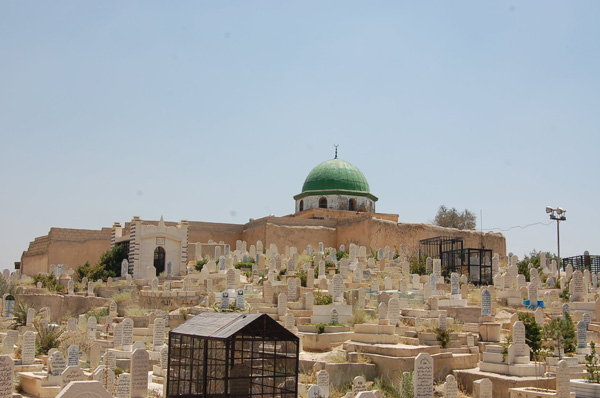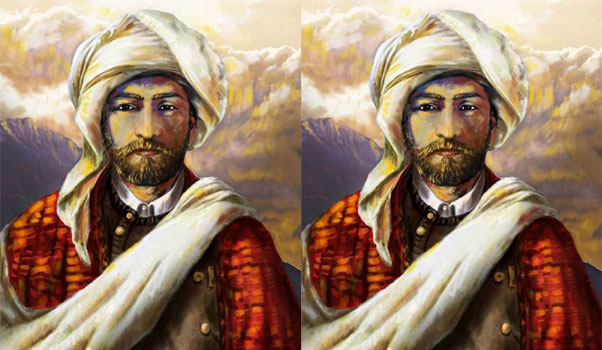One of the most famous figures in Kurdistan in the last two centuries is the religious figure and writer, Mawlana Khalid Naqshbandi. In addition to Kurdistan, he has a reputation in many other countries such as Iraq, Syria, Turkey, Pakistan, Afghanistan, India, Saudi Arabia, Oman, and ….
Mawlana Khalid was born in 1779 AD that is 244 years ago in a village called Qaradagh. He completed his primary education with his father, Mawlana Ahmed, son of Hussein Osman. Later he moved to Suleimani to continue his education. At that time, education in Kurdistan was such that the students could choose their teachers and trainers. This is the reason why Mawlana Khalid had the privilege of being educated by many eminent figures of that time such as Seyyed Abdelkarim Barzanji, who was the teacher of Abdulrahman Pasha Mosque in the Sarchiman neighborhood in Suleimani, Seyyed Abdulrahim, the brother of Sheikh Abdelkarim, Sheikh Abdullah Kharpani, Mullah Ibrahim Biaraie, Mullah Jalal Khurmali, Mullah Mahmoud Ghazai, Mullah Salih Tarmari, Mullah Abdulrahim Ziarati, and Mullah Mohammad Balaki. After completing his education with these teachers, he received permission from Sheikh Mohammad Qassim Snai to teach and lecture.
After receiving permission to teach and lecture, Mawlana Khalid became very famous for his extensive knowledge and ability to describe religious, intellectual, and philosophical topics throughout the Middle East and he was invited by many authorities of different regions to go to their countries to teach and have his own private school.
Due to his fame, Abdulrahman Pasha, the king of Baban, among all the scholars of that time especially chose and invited him to attend and teach at one of the religious schools in Suleimani.
However, he did not agree to this request at first. After the plague spread in Suleimani in 1213 Hijri and his teacher, Sheikh Abdelkarim Barzanji died, he went to Suleimani and without caring for financial income he began to teach without receiving a fee.
Mawlana Khalid went to Haj in 1805 AD, i.e., 1225 Hijri. After visiting Medina, he went to Mecca. While he was walking around Ka'ba, he noticed a man in a black cloak who had faced him and turned his back to Ka'ba. At first, Mawlana Khalid thought that this man might be a non-believer who is insulting God by turning his back to Ka'ba, but the man found out Mawlana Khalid's intention and asked him, "Why do you judge me? It is more important to pay respect to Muslim men and women rather than Ka'ba." Mawlana Khalid immediately figured out that this man is not just an ordinary person. He fell in love with this man and asked him to take him as his student. But the man told him that you need to go to India and find what you want. I am not the person you want to be educated by. Thus, Mawlana Khalid returned to Suleimani.

Mawlana Khalid Naqshbandi
One day a Darwish named "Mirza Rahimullah Bayg" known as "Mohammad Azim Abadi" saw a Darwish of "Shah Abdullah Dehlavi Naqshbandi" and they decided to travel to India together.
In "Jahan Abad" Mawlana Khalid saw Sheikh Abdullah Dehlavi. Since Mawlana Khalid was very smart and knowledgeable, he became Shah Abdullah's favorite student after five months and he succeeded in becoming one of the most important figures in Naqshbandi Tariqat to be allowed to lecture in all five branches of Tariqat that were Naqshbandi, Qaderi, Sohrewardi, Kobrawai and Chashtyi. He also was allowed to teach all the subjects of Hadith, Tafsir (interpretation of the Quran and the Prophet's Hadith), Tassawof (a subject in Sufism), and the prayers. After a year Shah Abdullah Dehlawi ordered him to serve the famous lecturer "Mawlana Abdelaziz Hanafi" and he received permission to teach and lecture all the subjects at that time. He returned to Kurdistan due to these great figures' order.
Mawlana Khalid went back to Suleimani in 1811 AD. He was received in the city with great enthusiasm by the people. While he was at Suleimani he taught and lectured many people. After a while, he decided to go to Baghdad to visit "Sheikh Abdulkadir Gailani's" court and stayed there for five months as he was teaching at the "Qaderiyeh" school.
His second trip to Suleimani was after he visited Baghdad and paid his respect to Sheikh Abdulkadir Gailani's tomb and teaching for five months at Sheikh's school in 1811 AD. Upon his arrival, people from every corner of Kurdistan, Iraq, and Sham went to Suleimani to seek his teaching and guidance. This led to his foes' envy and made them attempt to murder him. Thus, he decided to go back to Baghdad in 1813 in order to relieve himself from their jealousy and their plots. He began to lecture at "Ihsaniyeh" school which was repaired by "Dawood Pasha", Baghdad's authority official. This school is known as "Khalidiyeh" school nowadays.
The third trip of Mawlana Khalid to Suleimani was at 1231 Hijri. After Mawlana Khalid's fame spread throughout the country, Mahmoud Pasha Baban respectfully asked Mawlana Khalid to go back to Suleimani and hold his teaching and lecturing classes in this city and build his own private school. Not only they built a school for him, but they also donated a lot of land and money. "Kamalan" is one of the villages that was donated to Mawlana Khalid.
This time Mawlana Khalid began his lectures meetings and classes enthusiastically in Suleimani and many people from all parts of Kurdistan and the surrounding countries such as Saudi Arabia, Bahrain, Afghanistan, Iraq, and Sham came to Suleimani to take part in his classes. This time, after Mawlana Khalid's classes got popular, once more his foes decided to act against him and they even attempted to assassin him. They also had talked behind his back to Mahmoud Pasha Baban and had made him doubt Mawlana Khalid. All these events led Mawlana Khalid to leave Suleimani forever this time, after six years of working and teaching. He moved back to Baghdad in 1820 AD and stayed at the school he had founded.
After moving back to Baghdad, he was invited to Sham in 1825 and traveled to Sham from Deir Ez Zur. Governmental officials and high ranked figures welcomed him formally and poets such as "Sheikh Shahin Attar", and "Sheikh Mohammad Jumlayi Hanafi Dameshqi" wrote poems to welcome him.
Mawlana Khalid began his classes in Damascus with a great deal of focus and paying attention to details until the plague spread in Sham in 1826 AD. Both of his sons died of the plague and in the end, Mawlana also got infected by the disease and died on a Friday night on June 8th, 1827 after writing his will and naming his successors who were "Sheikh Abdullah Harati", "Abdelfattah Aqrayi" and "Sayyed Ismaeel Ghazzi".









